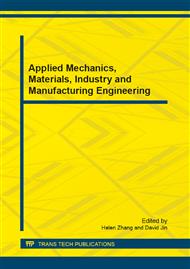p.93
p.97
p.103
p.107
p.111
p.115
p.120
p.124
p.128
Treatment of the Lead Waste Water with Electrochemical Process
Abstract:
Industrial waste water with high levels of lead has serious threat to human health and other organisms. Power generation methods were used for recycling of lead. Some factors such as temperature,power generation time,the anode material, type and concentration of anode area solution on the power generation process were studied to find the optimal process parameters.The experimental results show that:in the optimum conditions,the recovery rate of lead was more than 90% and the lead concentration in waste water has reached the discharge standard. This method does not produce by-products of environmental pollution in the power generation process and needn’t external supply of energy but produce certain energy. So it is a green chemistry technology.
Info:
Periodical:
Pages:
111-114
DOI:
Citation:
Online since:
April 2012
Authors:
Price:
Сopyright:
© 2012 Trans Tech Publications Ltd. All Rights Reserved
Share:
Citation:


